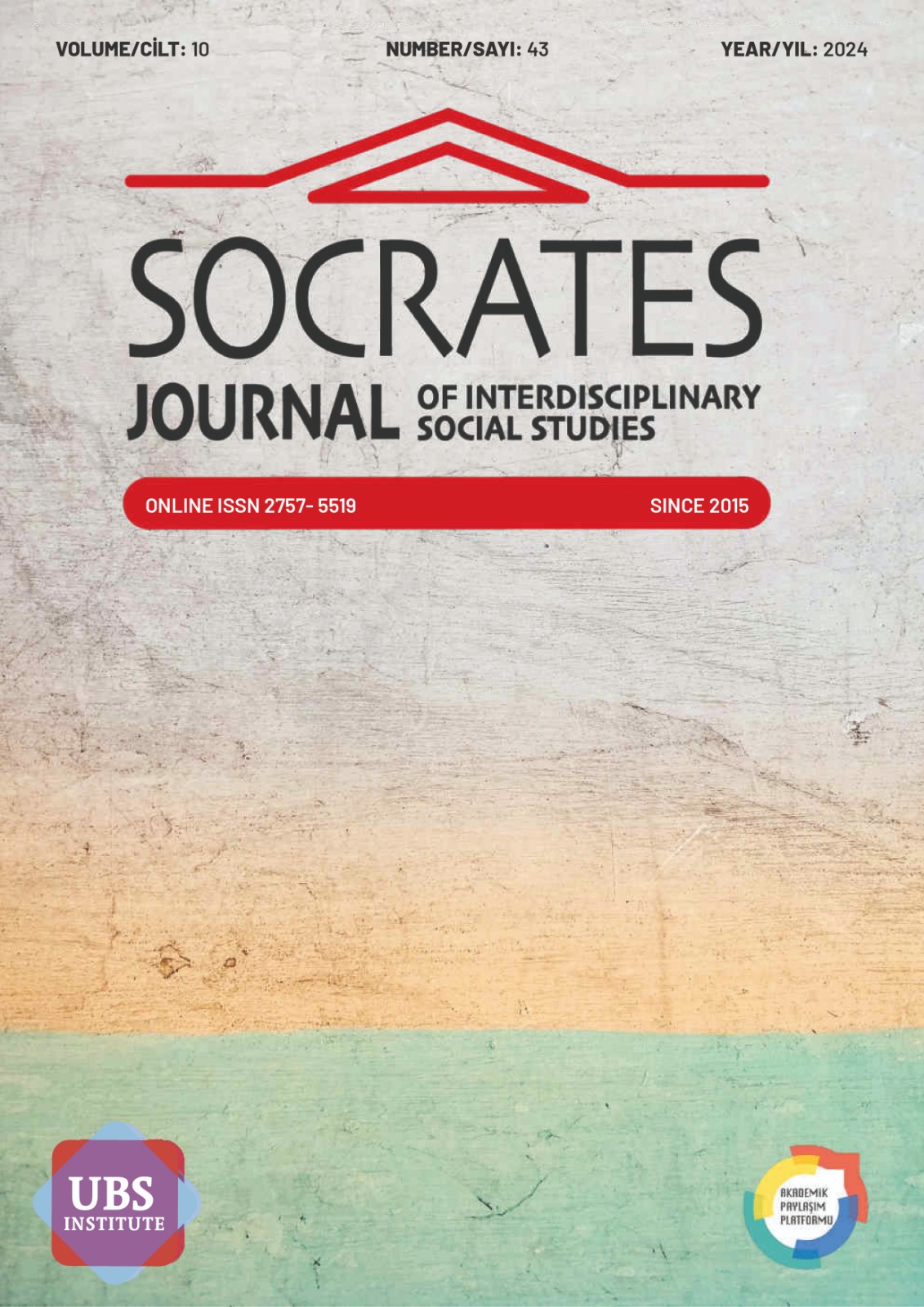ETKİN FİNANS YÖNETİMİ UYGULAMALARININ İŞLETME PERFORMANSI ÜZERİNDEKİ ETKİLERİ
THE EFFECTS OF EFFECTIVE FINANCIAL MANAGEMENT PRACTICES ON BUSINESS PERFORMANCE
DOI:
https://doi.org/10.5281/zenodo.12699929Anahtar Kelimeler:
Finans Yönetimi, İşletme Performansı, Finansal Risk Yönetimi, Likidite Yönetimi, İnovasyon Yatırımları, Kurumsal Yönetim, Finansal Teknolojiler, Makroekonomik Faktörler, Sektörel Analiz, Karşılaştırmalı Ülke AnaliziÖzet
Bu çalışma, etkin finans yönetimi uygulamalarının işletme performansı üzerindeki etkilerini kapsamlı bir şekilde incelemektedir. Araştırma, likidite yönetimi, finansal risk yönetimi, inovasyon yatırımları ve kurumsal yönetim uygulamaları gibi çeşitli finans yönetimi boyutlarını ele almaktadır. Çalışmanın amacı, bu uygulamaların işletmelerin finansal performansı üzerindeki etkilerini analiz etmek, sektörel farklılıkları ortaya koymak ve ülkeler arası karşılaştırmalar yaparak makroekonomik faktörlerin etkilerini değerlendirmektir. Araştırma metodolojisi, hem nicel hem de nitel yöntemleri içeren karma bir yaklaşım benimsemektedir. Nicel analizler için panel veri analizi, çoklu regresyon analizi ve ANOVA gibi istatistiksel teknikler kullanılmıştır. Nitel veriler ise derinlemesine mülakatlar ve vaka çalışmaları yoluyla toplanmıştır. Çalışma, Türkiye ve Endonezya’daki imalat ve finans sektörlerinden seçilen işletmeleri kapsamaktadır. Bulgular, etkin finans yönetimi uygulamalarının işletme performansı üzerinde genel olarak olumlu bir etkiye sahip olduğunu göstermektedir. Özellikle, likidite yönetimi, finansal risk yönetimi ve inovasyon yatırımlarının işletmelerin kârlılığı ve piyasa değeri üzerinde pozitif etkileri olduğu tespit edilmiştir. Sektörel analizler, imalat ve finans sektörleri arasında finans yönetimi uygulamalarının etkinliği açısından anlamlı farklılıklar olduğunu ortaya koymuştur. Ülkeler arası karşılaştırmalar ise makroekonomik faktörlerin, özellikle döviz kuru volatilitesinin, işletmelerin finansal performansı üzerindeki önemli etkisini vurgulamıştır.
Çalışma ayrıca, finansal teknolojilerin (FinTech) ve dijital dönüşümün işletmelerin finans yönetimi stratejileri üzerindeki etkilerini de incelemiştir. Bulgular, dijital finansal inovasyonların ve bilgi yönetimi uygulamalarının işletmelerin operasyonel verimliliğini artırdığını ve rekabet avantajı sağladığını göstermektedir. Sonuç olarak, bu araştırma etkin finans yönetimi uygulamalarının işletme performansı üzerindeki kritik rolünü ortaya koymaktadır. Çalışmanın bulguları, işletme yöneticileri ve finansal karar alıcılar için önemli çıkarımlar sunmakta ve gelecekteki araştırmalar için yeni yönler önermektedir. Özellikle, sürdürülebilirlik odaklı finans yönetimi uygulamaları ve çevresel, sosyal ve yönetişim (ESG) faktörlerinin finansal kararlara entegrasyonu gibi konular, gelecekteki araştırmalar için potansiyel alanlar olarak öne çıkmaktadır.
Referanslar
Al-Dmour, A., Al-Dmour, R., & Rababeh, N. (2020). The impact of knowledge management practice on digital financial innovation: the role of bank managers. VINE Journal of Information and Knowledge Management Systems, 51(3), 492-514.
Battisti, E., Alfiero, S., Quaglia, R., & Yahiaoui, D. (2022). Financial performance and global start-ups: the impact of knowledge management practices. Journal of International Management, 28(4), 1-18.
Del Carpio, X., Nguyen, H., Pabon, L., & Wang, L. C. (2015). Do minimum wages affect employment? Evidence from the manufacturing sector in Indonesia. IZA Journal of Labor and Development, 4(17), 1-30.
Edouard, S. (2021). Financial Management Practices on Financial Performance at Selected Private Insurance Companies, Kigali, Rwanda. International Journal of Scientific Research and Management, 9(10), 2492-2506.
Fentaw, A.A., & Thakkar, A. (2022). The effect of financial innovations on the profitability of private Commercial Banks in Ethiopia. Journal of Positive School Psychology, 6(5), 5928-5939.
Handri, H., Mulyaningsih, H. D., Hidayat, A. K., Kurniawan, R., & Rachmawati, A. W. (2021). The impact of Indonesian oil price (CPI) and macroeconomics on investments in the manufacturing sector in Indonesia.
Hidayat, I., & Sutria, P. O. (2022). Influence of Determined Tax Load, Tax Planning, and Profitability in Profit Management in The Company Manufacturing The Mining Sector, The Coal Sub Sector Listed on The Indonesia Stock Exchange Year. APTISI Transactions on Management (ATM), 7(1), 79-85.
Jefry, J., & Djazuli, A. (2020). The Effect of Inflation, Interest Rates and Exchange Rates on Stock Prices of Manufacturing Companies in Basic and Chemical Industrial Sectors on the Indonesia Stock Exchange (IDX). International Journal of Business, Management & Economics Research, 1(1), 34-49.
Kağnicioğlu, C. H., & Seyfedin, S. M. (2019). The Impact of Financial Management Practices on Growth and Development of Micro and Small Enterprise. The Case of Addis Ketema Sub-City, Addis Ababa, Ethiopia. Researcher, 7(2), 33-50.
Lawal, B. (2016). Re-duplication of corporate governance codes and the dilemma of firms with dual regulatory jurisdictions. Corporate Governance, 16(3), 476-489.
Michaels, A. (2017). Relationship of corporate social responsibility disclosure on information asymmetry and the cost of capital. Journal of Management Control, 28(3), 251-274.
Musyrifah. (2020). The Liquidity And Activity Effect On Profitability Of Pulp And Paper Sub-Sector Manufacturing Companies In Indonesia Musyrifah. Management and Science Proceedings, 1(1).
Noviyati, & Agustiningsih, W. (2023). The Effect of Financial Performance, Leverage and Company Size on Company Value in the Food and Beverage Manufacturing Sector. International Journal of Asian Business and Management, 2(3), 289-308.
Prihatin, A., & Aisyah, S. (2022). The Effect of Monetary Policy on the Performance of the Manufacturing Industry Sector in Indonesia. Urecol Journal. Part B: Economics and Business, 2(1), 1-8.
Sathyamoorthi, C., Mapharing, M., Mphoeng, M., & Dzimiri, M. (2020). Impact of financial risk management practices on financial performance: Evidence from commercial banks in Botswana. Applied Finance and Accounting, 6(1), 25-39.
Toraman, C., Abdioğlu, H., İşgüden, B. (2009). İşletmelerde inovasyon sürecinde entelektüel sermaye ve yönetim muhasebesi kapsamında değerlendirilmesi. Afyon Kocatepe Üniversitesi İ.İ.B.F. Dergisi, 11(1), 91-120.
Tunçer, E. (2006). Çok boyutlu performans değerleme modelleri ve bir balanced scorecard uygulaması. Yüksek lisans tezi, Afyon Kocatepe Üniversitesi, Afyonkarahisar.
Yuliani, Z., Sudarma, D., & Solimun, M. (2012). Diversification, investment opportunity set, environmental dynamics and firm value (empirical study of manufacturing sectors in Indonesia Stock Exchange). IOSR Journal of Business and Management (IOSR-JBM), 6(4), 01-15.
İndir
Yayınlanmış
Nasıl Atıf Yapılır
Sayı
Bölüm
Lisans
Telif Hakkı (c) 2024 Socrates Journal of Interdisciplinary Social Studies

Bu çalışma Creative Commons Attribution 4.0 International License ile lisanslanmıştır.


